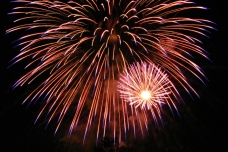
For years (okay, my entire life), I didn’t make New Year’s resolutions. I’d vaguely entertain the idea, maybe write something down, but it was always half-hearted – something I did because I was supposed to and not with any real conviction. Over time, I developed an aversion to resolutions. Coming up with them and sharing them felt like a setup for failure, and often when I thought about what I truly wanted to achieve in the new year, I couldn’t come up with anything I felt excited about.
It does, though, feel natural to take stock of my life this time of year – to review how things are going and think about what I’d like to work on. I know – semantics, but the word “resolution” has pressure-y connotations to me. Plus, resolutions are usually things people want to DO: exercise three days a week, eat more kale, work on that business plan. I always felt at a loss starting with, “What do you want to do?” So, this year, I took a step back and looked at the big picture. I asked myself, “What do I want to feel?” My answer was, “calmer, more focused and more confident in my decisions.” From there, I came up with three principles that would help: simplicity, intuition and freedom. Let me break it down:
Simplicity
This is a hard thing to achieve in the modern world. With all of the input we get each day from other people, our phones and media, it’s difficult to filter out what is useful. I am in the habit of considering everything. This is a good trait, in that I am open to new ideas, but being open to EVERY idea leads to feeling scattered. So, I will immediately ignore the stuff I don’t need right now, without feeling compelled to explore. And, I will expose myself to less stuff by unsubscribing, turning off notifications and generally spending less time on social media. This actually means not reading so much, too, or at least not so many personal growth books. These are useful, but like they say….everything in moderation.
Intuition
We have gotten away from respecting our intuition, as people and parents. How DID people parent without all those expert opinions foisted on them? How did we make decisions before there were warning signs about not running and not diving? Yes, advice and warning signs can be useful, but they’ve become so ubiquitous, we’ve stopped trusting our intuition and instead rely on the experts to tell us what to do. We don’t even eat intuitively; we go find a prescribed diet that we think works for us. By avoiding being overrun by social media and by committing to doing regular, self-care things like meditating and getting outside, I can cultivate the centeredness I need to hear my intuition (distinguish it from irrational, reactionary thoughts) and respect it.
Freedom
“Do you want to be safe, or do you want to be free?” Louis Sachar, author of The Wayside School series, asks a character in one of his books this – a child who has wandered down into the basement of the school and is lost. The child says he wants to be free, so he is allowed to find his own way out of the basement. From then on, he doesn’t have to participate in any school activity he doesn’t want to. This means he gets to sit on the floor and chew gum if he wants, but it also means he misses a really fun day in P.E. when he decides not to go. Freedom can feel, well, freeing, but it can also be scary. When you step outside the norm – go into business for yourself, for example – you are responsible for much more. Freedom can be stressful, but it can also be completely worth it. And, by mindfully attending to simplicity and intuition, freedom can be less stressful and scary and work out wonderfully.
This is a very different approach for “resolutions” than I’ve been exposed to for most of my life. Instead of starting with action, I started with the big picture, because it’s more stable and enduring; the actions that support it may change over the year. What I need to do to promote simplicity, intuition and freedom will grow and change from January to December.
The Buddha says, of his own teachings no less, “Only a fool would carry the raft around after he had already reached the other shore of liberation.” In the same way, while my three principles may guide me through the year, I will not cling to the individual actions that support them past when they are useful to me. The actions are only tools to get where I want to go.

1 Comment
Comments are closed.